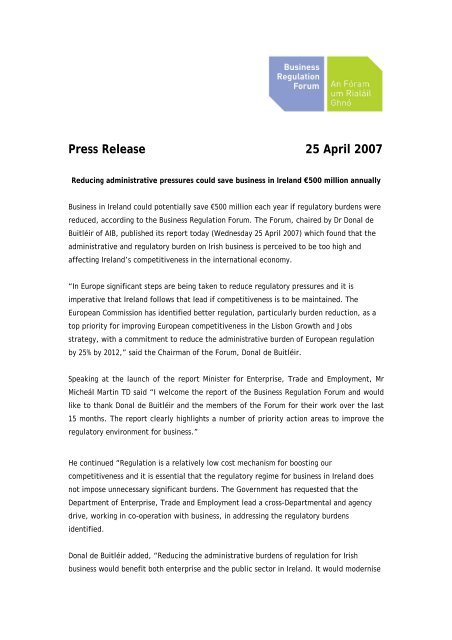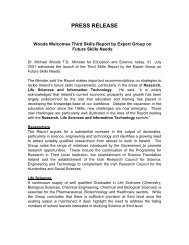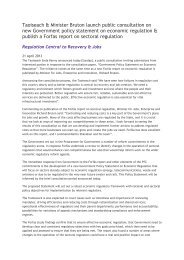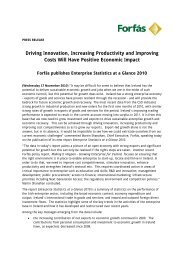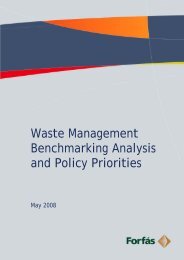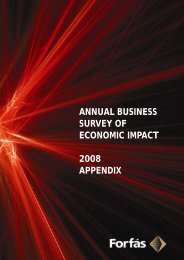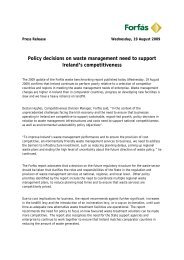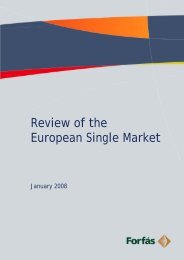Report of the Business Regulation Forum Press Release - Forfás
Report of the Business Regulation Forum Press Release - Forfás
Report of the Business Regulation Forum Press Release - Forfás
You also want an ePaper? Increase the reach of your titles
YUMPU automatically turns print PDFs into web optimized ePapers that Google loves.
<strong>Press</strong> <strong>Release</strong> 25 April 2007<br />
Reducing administrative pressures could save business in Ireland €500 million annually<br />
<strong>Business</strong> in Ireland could potentially save €500 million each year if regulatory burdens were<br />
reduced, according to <strong>the</strong> <strong>Business</strong> <strong>Regulation</strong> <strong>Forum</strong>. The <strong>Forum</strong>, chaired by Dr Donal de<br />
Buitléir <strong>of</strong> AIB, published its report today (Wednesday 25 April 2007) which found that <strong>the</strong><br />
administrative and regulatory burden on Irish business is perceived to be too high and<br />
affecting Ireland’s competitiveness in <strong>the</strong> international economy.<br />
“In Europe significant steps are being taken to reduce regulatory pressures and it is<br />
imperative that Ireland follows that lead if competitiveness is to be maintained. The<br />
European Commission has identified better regulation, particularly burden reduction, as a<br />
top priority for improving European competitiveness in <strong>the</strong> Lisbon Growth and Jobs<br />
strategy, with a commitment to reduce <strong>the</strong> administrative burden <strong>of</strong> European regulation<br />
by 25% by 2012,” said <strong>the</strong> Chairman <strong>of</strong> <strong>the</strong> <strong>Forum</strong>, Donal de Buitléir.<br />
Speaking at <strong>the</strong> launch <strong>of</strong> <strong>the</strong> report Minister for Enterprise, Trade and Employment, Mr<br />
Micheál Martin TD said “I welcome <strong>the</strong> report <strong>of</strong> <strong>the</strong> <strong>Business</strong> <strong>Regulation</strong> <strong>Forum</strong> and would<br />
like to thank Donal de Buitléir and <strong>the</strong> members <strong>of</strong> <strong>the</strong> <strong>Forum</strong> for <strong>the</strong>ir work over <strong>the</strong> last<br />
15 months. The report clearly highlights a number <strong>of</strong> priority action areas to improve <strong>the</strong><br />
regulatory environment for business.”<br />
He continued “<strong>Regulation</strong> is a relatively low cost mechanism for boosting our<br />
competitiveness and it is essential that <strong>the</strong> regulatory regime for business in Ireland does<br />
not impose unnecessary significant burdens. The Government has requested that <strong>the</strong><br />
Department <strong>of</strong> Enterprise, Trade and Employment lead a cross-Departmental and agency<br />
drive, working in co-operation with business, in addressing <strong>the</strong> regulatory burdens<br />
identified.<br />
Donal de Buitléir added, “Reducing <strong>the</strong> administrative burdens <strong>of</strong> regulation for Irish<br />
business would benefit both enterprise and <strong>the</strong> public sector in Ireland. It would modernise
some practices within <strong>the</strong> public system and make it operate more efficiently. International<br />
evidence has shown that for this to be achieved it will require an impartial measurement <strong>of</strong><br />
<strong>the</strong> regulatory burdens and setting out specific objectives and timelines, in consultation<br />
with business and a strong political commitment.”<br />
The report <strong>of</strong> <strong>the</strong> <strong>Business</strong> <strong>Regulation</strong> <strong>Forum</strong> is based on submissions received from Irish<br />
businesses, dialogue with key stakeholders, in depth research on <strong>the</strong> impact <strong>of</strong> regulation<br />
on business in Ireland and research on international developments in better regulation.<br />
A copy <strong>of</strong> <strong>the</strong> report is available for download at www.businessregulation.ie<br />
Ends<br />
Notes to editors<br />
The <strong>Business</strong> <strong>Regulation</strong> <strong>Forum</strong> (BRF) was established in 2005 by <strong>the</strong> Minister for<br />
Enterprise, Trade and Employment, Mr Micheál Martin TD, to advise on regulatory<br />
matters impacting on business.<br />
The <strong>Forum</strong> has recommended that a burden reduction programme for Ireland should have<br />
<strong>the</strong> following characteristics:<br />
1. It should focus on <strong>the</strong> five areas where regulation has been identified as most<br />
burdensome in Ireland: tax, health & safety, environmental regulation, requests for<br />
statistical information, and employment & company law;<br />
2. The Standard Cost Model should be used to measure <strong>the</strong> burdens within <strong>the</strong>se areas<br />
as well as benefits achieved;<br />
3. There should be a target, calculated as a percentage <strong>of</strong> GNP or expressed as an<br />
absolute amount, based on what has been achieved in o<strong>the</strong>r countries;<br />
4. There should also be a clear time-frame.<br />
During 2006, <strong>the</strong> BRF:<br />
Invited submissions from individual consumers, companies, organisations and interest<br />
groups on <strong>the</strong>ir views <strong>of</strong> <strong>the</strong> regulatory environment in Ireland and how it could be<br />
improved for business.<br />
Commissioned a number <strong>of</strong> case studies <strong>of</strong> companies <strong>of</strong> different sizes across a range<br />
<strong>of</strong> sectors in order to map <strong>the</strong> current regulatory landscape for enterprise in Ireland.<br />
Assessed <strong>the</strong> potential for Ireland adopting a methodology for measuring and<br />
reducing <strong>the</strong> administrative burden <strong>of</strong> regulation on business.<br />
Engaged in dialogue with key Government Departments, agencies, regulators,<br />
business representatives, as well as national and international regulatory experts.<br />
Research and administrative support to <strong>the</strong> <strong>Forum</strong> was provided by <strong>Forfás</strong>.<br />
Explanation <strong>of</strong> The Standard Cost Model<br />
The Standard Cost Model (SCM) is a methodology that has been developed<br />
internationally for determining <strong>the</strong> source <strong>of</strong> administrative burdens imposed by<br />
regulation. It quantifies <strong>the</strong> cost <strong>of</strong> complying with information requests from<br />
Government.
This methodology can be used to measure <strong>the</strong> burden <strong>of</strong> a single law, selected areas <strong>of</strong><br />
legislation or all legislation within a country. Fur<strong>the</strong>rmore, <strong>the</strong> SCM is suitable for<br />
measuring simplification proposals as well as <strong>the</strong> administrative consequences <strong>of</strong> a new<br />
legislative proposal.<br />
The SCM estimates <strong>the</strong> cost <strong>of</strong> complying with each information obligation using <strong>the</strong><br />
following cost parameters:<br />
- Price: internal wage cost or costs for external services;<br />
- Time: <strong>the</strong> amount <strong>of</strong> time required to complete <strong>the</strong> administrative activity; and<br />
- Quantity: <strong>the</strong> size <strong>of</strong> <strong>the</strong> population <strong>of</strong> businesses affected by <strong>the</strong> regulation and<br />
<strong>the</strong> frequency that <strong>the</strong> activity must be carried out each year.<br />
Combining all <strong>the</strong>se elements gives <strong>the</strong> basic SCM formula:<br />
Price (time x tariff) x Quantity (population x frequency)<br />
The SCM identifies <strong>the</strong> specific information obligations within regulations that are<br />
costing businesses <strong>the</strong> most and quantifies costs so that targets can be set and progress<br />
measured over time.


